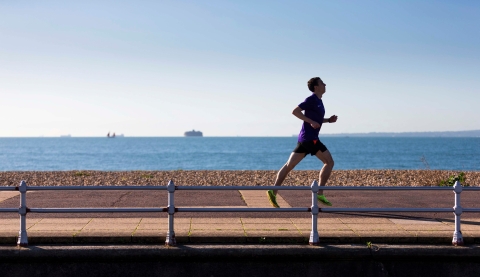

We've put together some useful tips on exercising safely in the heat. Don't let the sun get in the way of your goals.
Well it’s been hot recently hasn’t it, really hot, and for the majority of us when it’s boiling outside we seek shade, cold dark rooms, and paddling pools we can just about sit down in. When all that fails we can either remove our shirts and when questioned why proclaim “I’m boiling”, or just stay as still as possible.
The big question, what happens to our exercise when it's boiling? Is it the first thing to drop, or the first place you go? We’re big fans of the 1st Floor Gym when it’s hot, if you know, you know. If you’re still keen to workout in the heat we’ve pulled together some simple tips to help you stay safe when exercising during the summer months and those particularly hot days.
Firstly, let's talk why exercising in the heat can take it out of you more than normally. As you start to workout or increase your activity levels, your thermoregulation system kicks in and attempts to maintain your core body temperature as best it can. It does this by sending blood to the skin to get rid of any excess heat, causing you to sweat, which is why you may find yourself red-faced when exercising. Naturally, your body is now in an internal conflict between supplying blood to your vital organs to maintain your performance while still trying to cool your skin. Now, let’s dive into what we can do.
Tips for exercising safely in the heat
-
Keep your fluid intake up: Help your body to use its natural cooling system (sweating) by staying well-hydrated with water. You should do this before, during and after exercise to ensure you’re not pushing your body by stepping on the treadmill. Avoid waiting until you're thirsty to drink fluids. A key factor in heat illness is dehydration, we’re looking for a straw-like colour to your wee to show you’re hydrated. If you’re planning an intense session, intervals, sprints, heavy lifting sports or isotonic drinks can be particularly useful. Sports drinks can help replace the sodium, chloride and potassium your body loses when sweating.
- Know your medical risks: If you use medication or suffer from a medical condition that can increase your risk of suffering from a heat-related illness, speak with your doctor about precautions specific to you before working out in the heat. You know your body the best so don’t push it, if you still feel the need, within your capabilities go easy.
- Keep an eye on the temperature: If you’re planning on heading outdoors for a workout, check the weather forecasts and heat alerts. Know what the temperature is expected to be for the duration of your planned outdoor activity and again take some fluids with you.
- Choosing your time to exercise: Where you can, avoid exercising in the midday sun. Early morning or late evening are kinder options for your body to workout in, when it's likely to be cooler outdoors. Or head in to our first-floor gym - yeah the floor is orange but it’s so cool, not because of the orange.
- Know your personal level of fitness: If new, returning to exercise, or feel you would class yourself as unfit. Be extra cautious when working out in the heat. Your body might have a lower tolerance to working out in the heat. To help you exercise, start slow and build up intensity reduce your exercise intensity if anything feels too much and take regular breaks.
- Have a plan B: If completing your workout outdoors in the heat concerns you, consider staying indoors. Work out in an area with air conditioning (St Paul’s gym ground and first floor).
- Clothing choice: Loose-fitting and light-coloured clothing can help sweat evaporate and keep you cooler. Avoid dark colours, these absorb heat. If it's comfortable and practical, consider wearing a light-coloured hat while working out.
- Protect yourself with sunscreen while working out outdoors: Sunburn is never fun, decrease your chance of burning by using the appropriate sunscreen factor for your skin tone/type. Sunburn impacts your body's ability to cool itself and increases the risk of skin cancer.
- Take time to acclimate your body: If you’re used to working out indoors now and the added heat is not welcome, just take it easy at first. It can take a couple of weeks to adjust, so gradually increase your intensity.
Exercising in the heat puts extra stress on your body, particularly if you’re a relative beginner. Taking sensible precautions reduces your risk of serious illness from the heat while exercising. If you would like any advice next time we get a heatwave, speak to one of our fitness team who can advise you.
Not yet a member with us? You can sign up for a Ravelin Sports Centre membership today.

